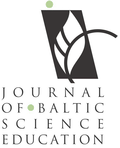EFFECTS OF INQUIRY-BASED TEACHING ON CHINESE UNIVERSITY STUDENTS’ EPISTEMOLOGIES ABOUT EXPERIMENTAL PHYSICS AND LEARNING PERFORMANCE
| Title | EFFECTS OF INQUIRY-BASED TEACHING ON CHINESE UNIVERSITY STUDENTS’ EPISTEMOLOGIES ABOUT EXPERIMENTAL PHYSICS AND LEARNING PERFORMANCE |
| Publication Type | Journal Article |
| Year of Publication | 2020 |
| Authors | Shi, W-Z, Ma, L, Wang, J |
| Journal | Journal of Baltic Science Education |
| Volume | 19 |
| Issue | 2 |
| Start Page | 289-297 |
| Pagination | Continuous |
| Date Published | April/2020 |
| Type of Article | Original article |
| ISSN | 1648-3898 |
| Other Numbers | E-ISSN 2538-7138 |
| Keywords | epistemologies of experimental physics, inquiry-based teaching, physics education |
| Abstract | Students' epistemologies of experimental physics refer to how they understand the role of experimentation as well as the experimental operation and design and communication of results in physics. This research aimed to find whether students in inquiry-based physics laboratory activities show more expert-like epistemologies of experimental physics and better course performance relative to courses using cookbook guided laboratory activities. The participants consisted of two classes of students in a Chinese university. They were divided into control group and experimental group. The experimental group was taught with inquiry-based teaching, while the control group was using cookbook teaching. Each group was taught by the same lecturer. Colorado Learning Attitudes about Science Survey for Experimental Physics were used to investigate students’ epistemologies about the nature of experimental physics. It was found that students in a traditional cookbook guided laboratory showed significant negative shifts on personal epistemologies, and in contrast, students’ epistemologies of experimental physics in inquiry-based laboratory had been significantly improved. The increase of scores in the control group was higher than the experiment group on experimental physics learning performance. The results were slightly different from other studies, some possible explanations were given. |
| URL | http://oaji.net/articles/2020/987-1586941778.pdf |
| DOI | 10.33225/jbse/20.19.289 |
| Refereed Designation | Refereed |
| Full Text |
